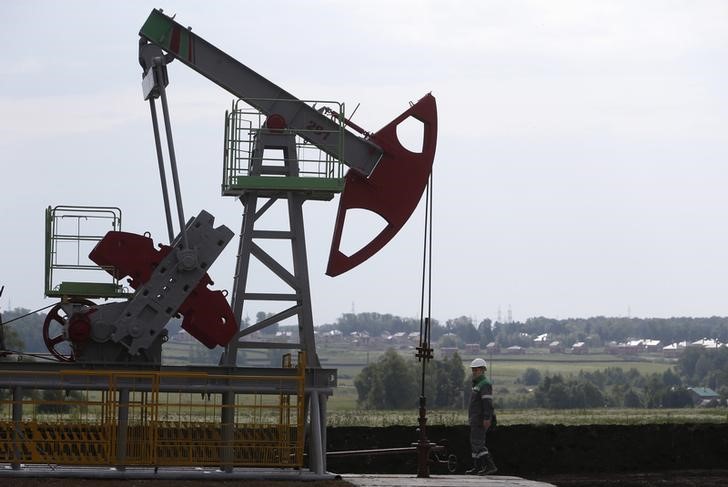Investing.com - Oil prices slid on Thursday, erasing some of Wednesday’s surge, ahead of a series of key meetings on the sidelines of this week’s G20 summit and a wider gathering of major oil producers beginning next Monday.
New York-traded West Texas Intermediate crude futures slumped 69 cents, or 1.2%, to $58.69 a barrel by 7:51 AM ET (11:51 GMT), while Brent, the benchmark for oil prices outside the U.S., traded down 75 cents, or 1.1%, to $64.94. Thursday's pullback followed a 2% surge after weekly government data showed U.S. crude inventories fell by the largest amount since 2016.
The G20 gathering - and more specifically, the bilateral meeting between U.S. President Donald Trump and Chinese counterpart Xi Jinping - is likely to provide more clarity about the path of global oil demand in the second half of the year, depending on how much or little progress the two sides make resolving their trade dispute. A White House spokesman told reporters Trump will meet Xi at 11:30 AM (2:30 GMT) local time in Osaka on Saturday, according to Reuters. That's 10:30 PM ET on Friday.
The South China Morning Post reported Thursday that Washington and Beijing have “tentatively agreed” on a truce that would put a hold on Trump’s pending round of additional tariffs on Chinese goods.
The Wall Street Journal later reported that Xi was planning to present Trump with proposed terms of a settlement designed to put an end to their trade conflict. The WSJ noted however that Beijing was including a list of conditions and it was not clear they would be acceptable to the American president.
“The best we can probably hope for is a commitment for further negotiations in the coming months and positive statements about removing current tariffs or, at least, holding off on additional tariffs,” said Ellen Wald, president of Transversal Consulting and Investing.com contributor.
“Of course, if China and the U.S. reach an agreement on trade at any point during the rest of 2019, we can expect oil prices to increase, as this will be seen as a positive sign for the global economy and oil demand,” she explained.
Another key meeting on the sidelines of the G20 will take place between Russian President Vladimir Putin and Saudi Crown Prince Mohammed Bin Salman. They will likely discuss whether and how to extend the current production cut agreement between OPEC and other producers, of which Russia is by far the largest.
OPEC and its partners are due to review that deal on July 1-2.
“Russia seems eager to roll over the current deal now,” Wald said, although she warned that once Moscow’ will look for any way to increase output once it overcomes current problems with contaminated oil in its export pipelines.
Elsewhere, Iraqi energy minister Thamir Ghadhban told Argus Media that he expects the current deal to be rolled over, but hinted at a push for deeper cuts in output, saying that the current deal "has not been very effective." Iraq, OPEC's second-largest producer, has been itself partly to blame for that, since it has only made 30% of the cuts it agreed to in December, according to Argus.
In other energy trading, gasoline futures slid 1.8% at $1.8955 a gallon by 7:55 AM ET (11:55 GMT), while heating oil fell 1.1% at $1.9573 a gallon.
Lastly, natural gas futures advanced 0.2% at $2.272 per million British thermal unit.
